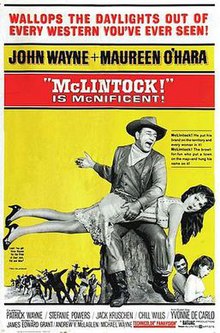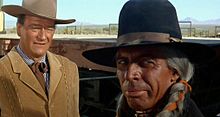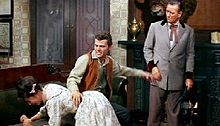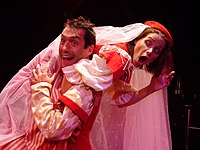McLintock!
- See also McClintock (disambiguation)
| McLintock! | |
|---|---|
 Theatrical film poster | |
| Directed by | Andrew V. McLaglen |
| Written by | James Edward Grant |
| Produced by | Michael Wayne |
| Starring | |
| Cinematography | William H. Clothier |
| Edited by | Otho Lovering Bill Lewis |
| Music by | De Vol |
Production company | |
| Distributed by | United Artists |
Release date |
|
Running time | 127 minutes |
| Language | English |
| Budget | $4 million[1] |
| Box office | $14.5 million[2] |
McLintock! is a 1963 American Western comedy film, starring John Wayne and Maureen O'Hara, directed by Andrew V. McLaglen. The film co-stars Wayne's son Patrick Wayne, Stefanie Powers, Jack Kruschen, Chill Wills, and Yvonne De Carlo (billed as special guest star). Loosely based on William Shakespeare's The Taming of the Shrew, the project was filmed in Technicolor and Panavision, and produced by Wayne's company, Batjac Productions.
In 1991, the film entered the public domain in the United States because the claimants did not renew its copyright registration in the 28th year after publication.
Plot
[edit]The year is 1895. Cattle baron and town namesake George Washington "G.W." McLintock lives as a bachelor on his ranch on the Mesa Verde. His wife, Katherine, abandoned him with no explanation and became a socialite back East two years prior; his daughter, Rebecca "Becky" McLintock, is away finishing her college degree. In town, G.W. is disliked by bureaucrat Matt Douglas, Indian agent Agard, and Governor Cuthbert H. Humphrey. Despite this, he is a friend to many, including Sheriff Lord, general store owner Jake Birnbaum, and the local beggars and Comanche Indians.
While inspecting a shipment of cattle, G.W. warns a group of homesteaders that the Mesa Verde is unsuitable for farming; an earlier group of homesteaders tried, but failed because of insufficient rain for growing crops. Devlin "Dev" Warren, a young man with a widowed mother and sister to support, asks G.W. for a job. G.W. initially refuses, but relents after Dev resorts to begging at the advice of aged drifter Bunny. Dev then lashes out in disgust after having to beg for a job. However, G.W. still hires him and also hires Dev's mother, Mrs. Warren, after tasting her cooking. G.W. then learns Katherine is in town seeking a divorce, which will give her a excuse to take Becky back East with her; hearing this, G.W. refuses. Katherine then decides to move back onto the ranch, and starts bossing everyone around, including Mrs. Warren.
The Comanche, led by Running Buffalo, come into town to meet a train carrying their newly-released chiefs; Sheriff Lord settles them near the homesteaders despite protests from Douglas. When a homesteader's daughter wanders off with her suitor, Douglas and the homesteaders assume the Comanche took her, and attempt to lynch Running Buffalo in retaliation. G.W. and his men try to defuse the situation, but a brawl ensues, with Katherine joining in on G.W.'s side.
The next day, Becky arrives home from college with a would-be suitor, Douglas' son "Junior." G.W. disapproves of Junior, so Katherine makes a show of approving to spite him. Also aboard Becky's train are four Comanche chiefs, one of whom is G.W.'s old enemy and blood brother Paramount Chief Puma. They have arrived for a hearing to determine if their people will be sent to a reservation in Fort Sill, Oklahoma. G.W. agrees to speak at the hearing on their behalf.
While preparing for Becky's welcome-home party, Dev and Becky get into an argument when he accuses Junior of being a "dude." At the party, Dev gets into a fistfight to protect Birnbaum's assistant Davy, and impresses everyone with his boxing skills. Later, after being deliberately taunted by Becky and Junior, Dev accuses Becky of being a trollop for kissing Junior before they were properly engaged. Becky demands G.W. shoot Dev for insulting her; G.W. relents and "shoots" him with a starter's pistol to teach Becky a lesson. Dev, angry that he could have been killed, spanks Becky with a coal shovel, which angers Katherine.
At the hearing the next day, G.W. delivers a plea from Puma to Governor Humphrey, but is ignored; as a result, the Comanche are ordered to be imprisoned until they can be sent to Fort Sill. Getting drunk that night, G.W. suggests to Bunny that, if the Comanche were to go out fighting as they requested, the Government might realize Humphrey's mismanagement of the territory and intervene.
G.W. returns home and pressures Mrs. Warren into drinking with him; while she tries to explain to G.W. that she is quitting as cook, Mrs. Warren eventually gives in. The two end up falling down the stairs while trying to turn in for the night. Katherine, overhearing their conversation, assumes the worst when she sees Mrs. Warren on G.W.'s lap at the foot of the stairs. Mrs. Warren then explains she is quitting because Sheriff Lord has asked her to marry him.
At the Fourth of July celebrations the next day, Katherine refuses Humphrey's advances, but continues to treat her husband harshly. Bunny, who took G.W. seriously, helps set the Comanches free by suppyling them with Krag-Jorgensen military rifles from a military boxcar. The Comanches then charge through town, free their chiefs, and escape with the cavalry in hot pursuit. While hiding in a haystack during the raid, Dev and Becky reconcile and become engaged. Encouraged by this, and on advice from Birnbaum, G.W. confronts Katherine, getting her to admit that she left because she found lipstick on his shirt and incorrectly assumed he was having an affair. After pursuing her through town and publicly spanking her, G.W. tells Katherine that she is now free to divorce him, and leaves for home. However, she follows him, and the two reconcile.
Cast
[edit]
- John Wayne as George Washington "G.W." McLintock
- Maureen O'Hara as Katherine "Kate" McLintock
- Patrick Wayne as Devlin "Dev" Warren
- Stefanie Powers as Rebecca "Becky" McLintock
- Jack Kruschen as Jake Birnbaum
- Chill Wills as Drago
- Yvonne De Carlo as Louise Warren
- Jerry Van Dyke as Matt Douglas Jr.
- Edgar Buchanan as Bunny Dull
- Perry Lopez as Davey Elk
- Strother Martin as Agard
- Gordon Jones as Matt Douglas
- Robert Lowery as Gov. Cuthbert H. Humphrey
- Hank Worden as Curly Fletcher
- Michael Pate as Puma, Chief of the Comanche Nation
- Bruce Cabot as Ben Sage, Sr.
- Edward Faulkner as Ben Sage, Jr.
- Mari Blanchard as Camille
- Leo Gordon as Jones
- Chuck Roberson as Sheriff Jeff Lord
- Bob Steele as Train Engineer
- Aissa Wayne as Alice Warren
- "Big" John Hamilton as Fauntleroy Sage
- H.W. Gim as Ching
- John Stanley (uncredited) as Running Buffalo
Production
[edit]The script was developed by John Wayne as a way for him to express his disapproval for how Westerns negatively represent Native Americans, his opinions on marital abuse, and discontent for political corruption from either party, intentionally contrasting previous films in which Wayne starred but had little creative-control, such as John Ford's The Searchers. Another sharp contrast from previous films of Wayne is the emphasis on comedy, and using the Western setting for slapstick possibilities. He offered the job of directing to Andrew McLaglen, son to Wayne's longtime co-star Victor McLaglen, who had directed a number of low-budget features and had worked widely in television. It was the first movie fully produced by Wayne's son, Michael, although Michael Wayne had worked on a number of other films in various capacities. The male juvenile lead was John Wayne's younger son, Patrick.[1]
Henry Hathaway said he was going to direct the film but Wayne was not willing to pay his fee.[3]
The film was shot at Old Tucson Studios, west of Tucson, Arizona, and at San Rafael Ranch House - San Rafael State Natural Area, south of Patagonia, Arizona, and Nogales.[4][1] Although the name of the territory is never mentioned, and the Mesa Verde region where the film is set is located predominantly in Colorado, New Mexico, and Utah, in the court scene, the flag of Arizona is seen alongside the U.S. flag, although the flag of Arizona was not created until 1917.
Many of the cast and crew, including Andrew McLaglen, William H. Clothier, Bruce Cabot, Chill Wills, Edward Faulkner, Hank Worden, Strother Martin, Michael Pate, Leo Gordon, Chuck Roberson, John Stanley (the Navajo actor and veteran member of John Ford's stock company, who plays "Running Buffalo"), Patrick and Aissa Wayne, as well as Maureen O'Hara, had worked with Wayne on other productions. Wayne insisted a supporting role be given to Yvonne De Carlo, whose husband had been injured making How the West Was Won.[5] Michael Wayne estimated the budget as being $3.5 to $4.0 million.[1]
As in many other John Wayne films, Wayne is wearing his favorite "Red River D" belt buckle. It can be best seen in the scene where G.W. addresses the homesteaders about 10 minutes into the film, and at the end of the scene where the Comanche ride through town on the way to "the last fight of the Comanche," around 10 minutes from the end of the movie.
In the DVD Special Feature "Maureen O'Hara and Stefanie Powers Remember McLintock!," O'Hara reported that when Wayne and she filmed the famous scene in which he spanked her with a coal scuttle shovel, he did not pull his strokes. "He really spanked me! My bottom was black and blue for weeks!"[6]
Music
[edit]
- "Love in the Country" sung by The Limeliters
- Music coordinator: "By" Dunham
- "Love in the Country" words and music by "By" Dunham and Frank DeVol
- "Just Right for Me", "Cakewalk", "When We Dance" words and music by "By" Dunham
Reception
[edit]The film was a box-office success, and a timely one, since The Alamo had cost Wayne in both financial and "box-office capital" terms.[7] McLintock! grossed $14,500,000 in North America,[2] earning $7.25 million in US theatrical rentals.[8]
Andrew McLaglen said the film "put me in the big time."[9] He made four more films with Wayne: Hellfighters (1968), The Undefeated (1969), Chisum (1970), and Cahill, U.S. Marshal (1973).


According to Bosley Crowther, "the broadly comic Western ... sounded like a promising idea"; "the scenery is opulent and the action out-of-doors, the color lush, and the cast made up almost entirely of recruits from John Ford's long cinematic cycle commemorating the tradition of the American frontier."[10] Since "the direction was entrusted to a relative newcomer, Victor McLaglen's television-trained son, Andrew V. McLaglen ... good intentions, when the task at hand is as difficult as lusty farce, are not enough."[10] Emanuel Levy, in a review years after the film's release, said the film is "significant because it marks the beginning of Wayne's attempt to impose his general views, not just political ones, on his pictures. Most of Wayne's screen work after McLintock! would express his opinions about education, family, economics, and even friendship."[11]
Novelization
[edit]Richard Wormser wrote a novelization of the screenplay.[12]
Public domain status
[edit]The film was produced by John Wayne's Batjac Productions and released through United Artists. Batjac failed to renew the copyright, which expired in 1991. In 1994, a legal case determined the film was in the public domain in the United States, but the music score remained under copyright.[13][14][15][16]
Batjac Productions, a company now owned by John Wayne's estate, retains distribution rights for "officially restored" versions of the film and holds the original film negatives, as well as rights to the film's musical score.
Home media
[edit]Despite being available in the public domain by various distributors for the past decade (including GoodTimes Home Video and Simitar Entertainment), the first official home video issue of the film was released in the mid-1990s by MPI Home Video. In 2005, Paramount Home Media Distribution struck a distribution deal with Batjac (which owns the original film negatives) and was granted exclusive distribution rights for an official remastered release debuting on DVD in 2005. This "official" DVD release uses a restoration made from the original camera negative, under license from Batjac, with a newly created 5.1 surround mix and the original monoaural. Bonus features include a new extensive documentary, a "2 Minute Fight School" featurette, photo and trailer galleries, and an audio commentary with Leonard Maltin, Frank Thompson, Maureen O’Hara, Stefanie Powers, Michael Pate, Michael Wayne, and Andrew McLaglen. In spite of this licensed release, numerous versions of the film are still being released by other companies, with most using old TV prints and film elements outside of Batjac's official restoration.
Olive Films released a bare-bones Blu-Ray in March 2013, using a 2012 2K scan of a 35-mm Technicolor element with the original monoaural track. Olive's release had no involvement from Batjac Productions, as the 2K restoration was provided by the Library of Congress and is classified as public domain, whereas the "official" restoration is copyrighted to Batjac with Paramount handling exclusive distribution.
Paramount followed up in May 2014 with their Blu-Ray release, under license from Batjac Productions. This release uses a brand new 4K remaster from the original camera negative with Dolby TrueHD 5.1 surround and original mono. It also carries over all the bonus features from the previous Paramount DVD, with the only new addition of the original theatrical trailer scanned in 2K from a 35-mm element.
Comic-book adaption
[edit]See also
[edit]References
[edit]- ^ a b c d Smith, Jack (November 25, 1963). "John Wayne's Latest Film a Family Affair". Los Angeles Times. p. A3.
- ^ a b Box Office Information for McLintock! Archived 2021-05-20 at the Wayback Machine The Numbers. Retrieved September 5, 2013.
- ^ Eyman, Scott (September–October 1974). "'I made movies' an interview with Henry Hathaway". Take One. p. 12.
- ^ "Locations for McLintock!". IMDb. Archived from the original on May 20, 2021. Retrieved February 25, 2015.
- ^ Steinberg, Jay S. "McLintock". Turner Classic Movies.
- ^ McLintock! Collectors Edition DVD. Released October 11, 2005. ASIN: B000ANVPPQ
- ^ Steinberg, Jay S. "McLintock! Article". Turner Classic Movies. Retrieved September 26, 2022.
- ^ "Top Rental Films of 1963", Variety, 8 January 1964 p 37. Please note this figure is film rentals accruing to distributors, not gross takings.
- ^ Dixon, Wheeler Winston (April 2009). "Andrew V. McLaglen: Last of the Hollywood Professionals". Archived from the original on May 20, 2021. Retrieved February 1, 2017.
- ^ a b Crowther, Bosley (November 14, 1963). "McLintock! (1963)". The New York Times. Archived from the original on May 20, 2021. Retrieved May 20, 2012.
- ^ Levy, Emanuel (July 31, 2006). "McLintock!". EmanuelLevy.com. Archived from the original on May 20, 2021. Retrieved May 20, 2012.
- ^ Wormser, Richard (1963). McLintock. Gold Metal. Greenwich, Connecticut: Fawcett. OCLC 28658671.
- ^ "Court Rules for 'Goodtimes' in McLintock! Case", in Billboard, May 14, 1994, pg. 73 & 82
- ^ Fishman, Stephen (2010), pp.337[full citation needed]
- ^ Batjac Productions, Inc. vs. GoodTimes Home Video Corp.—1998 Copr.L.Dec. P 27,825, 48 U.S.P.Q.2d 1647, 98 Cal. Daily Op. Serv. 8208, 98 Daily Journal D.A.R. 11,443. BATJAC PRODUCTIONS INC., a California Corp., Plaintiff-Appellant, v. GOODTIMES HOME VIDEO CORP., a Delaware Corp.; Marybeth Peters, Register of Copyrights, Defendants-Appellees. No. 97-55947. United States Court of Appeals, Ninth Circuit. Argued and submitted Aug. 5, 1998. Decided Nov. 5, 1998.
- ^ Maljack Productions vs. UAV Corp.—May 21, 1997. MALJACK PRODUCTIONS, INC., an Illinois corporation, and BATJAC PRODUCTIONS, INC., a California corporation, Plaintiffs, v. UAV CORPORATION, a North Carolina corporation, and MARY BETH PETERS, Register of Copyrights, Defendants. CONSOLIDATED WITH BATJAC PRODUCTIONS, INC., a California Corporation, Plaintiff, v. GOODTIMES HOME VIDEO CORP., a Delaware corporation, and MARY BETH PETERS, Register of Copyrights, Defendants.
- ^ "Gold Key: McLintock!". Grand Comics Database.
External links
[edit]- McLintock! at IMDb
- McLintock! at Rotten Tomatoes
- McLintock! at the TCM Movie Database
- McLintock! at the AFI Catalog of Feature Films
- McLintock! is available for free viewing and download at the Internet Archive (also widescreen version)
- 1963 films
- 1963 Western (genre) films
- 1960s Western (genre) comedy films
- American Western (genre) comedy films
- Batjac Productions films
- 1960s English-language films
- Films scored by Frank De Vol
- Films based on The Taming of the Shrew
- Films directed by Andrew McLaglen
- Films produced by John Wayne
- Films shot in Arizona
- United Artists films
- Films adapted into comics
- 1960s American films
- English-language Western (genre) comedy films
- Comanche in popular culture

